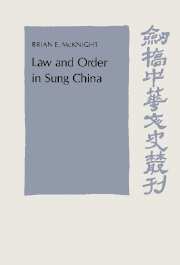Book contents
- Frontmatter
- Contents
- List of figures, maps, and tables
- Preface
- List of abbreviations
- 1 Introduction
- 2 The historical context
- 3 Crimes and criminals
- 4 Informal and semiformal agencies of law enforcement
- 5 Formal civil agencies of law enforcement
- 6 The role of the military in law enforcement
- 7 Supervision of law enforcement – the role of the intendants
- 8 Personnel selection
- 9 Urban crime and urban security
- 10 The Sung penal system
- 11 Jails and jailers in the Sung
- 12 Penal registration
- 13 The death penalty
- 14 Modifications of penalties
- 15 Conclusion
- Glossary
- Bibliography
- Index
3 - Crimes and criminals
Published online by Cambridge University Press: 23 December 2009
- Frontmatter
- Contents
- List of figures, maps, and tables
- Preface
- List of abbreviations
- 1 Introduction
- 2 The historical context
- 3 Crimes and criminals
- 4 Informal and semiformal agencies of law enforcement
- 5 Formal civil agencies of law enforcement
- 6 The role of the military in law enforcement
- 7 Supervision of law enforcement – the role of the intendants
- 8 Personnel selection
- 9 Urban crime and urban security
- 10 The Sung penal system
- 11 Jails and jailers in the Sung
- 12 Penal registration
- 13 The death penalty
- 14 Modifications of penalties
- 15 Conclusion
- Glossary
- Bibliography
- Index
Summary
Crime as a function of law
During the early 1960s the conventional wisdom of criminology – the positivist school which adopted the view that crimes were the objective properties of certain types of acts – was challenged by a new school of thought. This new approach, labeling theory, took the position that “crimes” were created when certain individuals defined certain examples of behavior as falling into categories of forbidden and punishable actions. In one rather simple sense their approach was rather like that of Thomas Szasz, who in his controversial book The Myth of Mental Illness maintained that the mentally ill are created by definition. The labeling theorists focused on how categories (“criminals”) are socially constructed from the outside. People are ill or are criminals because their society has defined certain behaviors as evidence of illness or criminality. These misbehaviors are legislated into existence. These recent theorists are unconsciously echoing here a theme reminiscent of the classical Taoists. Men create deviance and crimes by defining propriety and legality. In simple terms a crime is a violation of state rules that makes the perpetrator liable for sanctions. “A crime is any act committed in violation of a law that prohibits it and authorizes punishment for its commission.” The more laws there are, the more crimes there will be, and the fewer laws there are, the fewer crimes there will be. In Western jurisprudence this attitude is expressed by the legal principle of nullum crimen sine lege, that without a law against it no act can be considered a crime. The Sung period itself provides a classic illustration of this process of creating new crimes through legislation.
- Type
- Chapter
- Information
- Law and Order in Sung China , pp. 67 - 116Publisher: Cambridge University PressPrint publication year: 1992

